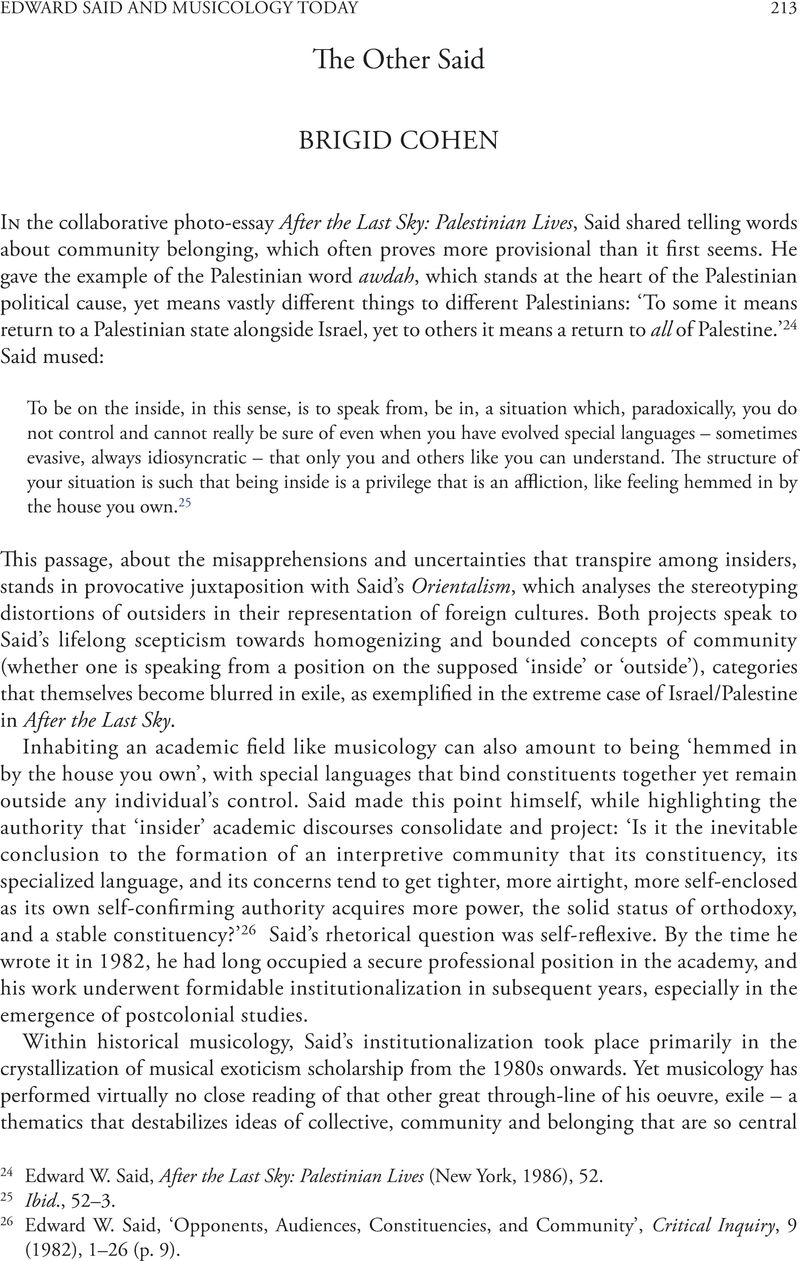No CrossRef data available.

24 Edward W. Said, After the Last Sky: Palestinian Lives (New York, 1986), 52.
25 Ibid., 52–3.
26 Edward W. Said, ‘Opponents, Audiences, Constituencies, and Community’, Critical Inquiry, 9 (1982), 1–26 (p. 9).
27 See Edward W. Said, ‘Introduction: Secular Criticism’, The World, the Text, and the Critic (New York, 1991), 1–30. For further discussion of interpretative dilemmas around Said's secular criticism, see Bruce Robbins, ‘Secularism, Elitism, Progress, and Other Transgressions: On Edward Said's “Voyage In”’, Social Text, 40 (1994), 25–37 (esp. pp. 26–9); Aamir R. Mufti, ‘Critical Secularism: A Reintroduction for Perilous Times’, Boundary 2, 31 (2004), 1–9 (esp. pp. 2–3); Emily Apter, Against World Literature: On the Politics of Untranslatability (London, 2013), esp. pp. 214–16; and Stathis Gourgouris, Lessons in Secular Criticism (New York, 2013), esp. pp. 12–13.
28 Said, ‘Opponents, Audiences, Constituencies, and Community’, 17, 19.
29 Mufti, ‘Critical Secularism’, 2.
30 I have addressed this historiographical question in more depth elsewhere. See Brigid Cohen, Stefan Wolpe and the Avant-Garde Diaspora (Cambridge, 2012); eadem, ‘Limits of National History: Yoko Ono, Stefan Wolpe, and Dilemmas of Cosmopolitanism’, Musical Quarterly, 97 (2014), 181–237.
31 Matthew Gelbart, The Invention of ‘Folk Music’ and ‘Art Music’: Emerging Categories from Ossian to Wagner (Cambridge, 2007), 236. Although invested in divergent methods, metaphors and disciplinary relationships, scholarship on popular and vernacular musics has also contended with the long shadow of national culture as a primary framework through which musical meaning is made intelligible. Mark Slobin's work represented an early intervention on this front; see his Subcultural Sounds: Micromusics of the West (Middletown, CT, 1993).
32 Divergent critical moves in this direction appear outside musicology in Michael Warner, Publics and Counterpublics (New York, 2005); Peggy Levitt, ‘What's Wrong with Migration Scholarship: A Critique and a Way Forward’, Identities: Global Studies in Culture and Power, 19 (2012), 1–8; and Roger Waldinger, The Cross-Border Connection: Immigrants, Emigrants, and their Homelands (Cambridge, MA, 2015).
33 Edward W. Said, Out of Place: A Memoir (London, 1999; repr. 2001).
34 Walter Benjamin, ‘On the Concept of History’, trans. Harry Zohn, Walter Benjamin: Selected Writings, 4 vols. (Cambridge, MA, 1996–2003), iv: 1938–1940, ed. Howard Eiland and Michael W. Jennings, 389–400.
35 Benedict Anderson, Imagined Communities: Reflections on the Origins and Spread of Nationalism (London, 1991), 24–6.
36 Edward W. Said, ‘Reflections on Exile’, Reflections on Exile and Other Essays (Cambridge, MA, 2000), 173–86 (p. 148).
37 Said, After the Last Sky, 33.
38 Ibid., 129.
39 ‘Internal colonialism’ is a flexible concept that has been adapted from varied theoretical perspectives to describe situations ranging from settler colonialism to class oppression to apartheid to genocide. For a historical overview, see Robert J. Hind, ‘The Internal Colonial Concept’, Comparative Studies in Society and History, 26 (1984), 543–68. For a capsule discussion within postcolonial studies, see Robert J. C. Young, Postcolonialism: An Historical Introduction (Oxford, 2001), 9.
40 Said, Orientalism, 27.
41 Hannah Arendt, The Origins of Totalitarianism (New York, 2004), 160, 210–384.
42 Aamir R. Mufti, Enlightenment in the Colony: The Jewish Question and the Crisis of Postcolonial Culture (Princeton, NJ, 2007), 13.
43 Ibid.
44 See, for example, Edward W. Said, ‘Yeats and Decolonization’, The Edward Said Reader, ed. Moustafa Bayoumi and Andrew Rubin (New York, 2000), 291–316 (p. 307).
45 Cohen, Stefan Wolpe and the Avant-Garde Diaspora, 267–74. See also Lydia Goehr's discussion of Said in ‘Music and Musicians in Exile: The Romantic Legacy of a Double Life’, Driven into Paradise: The Musical Migration from Nazi Germany to the United States, ed. Reinhold Brinkmann and Christoph Wolff (Berkeley, CA, 1999), 66–91 (pp. 86–8).
46 Said, Musical Elaborations, 51.
47 Ibid., 55.
48 Ibid., 70. Stathis Gourgouris presented related ideas on Said's musical nomadism at the Edward Said Conference in Utrecht in 2013.